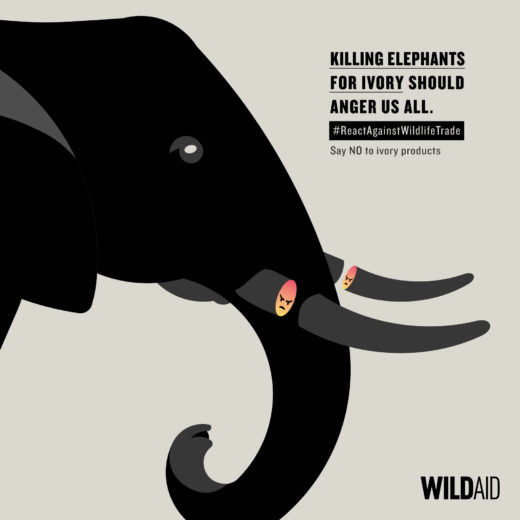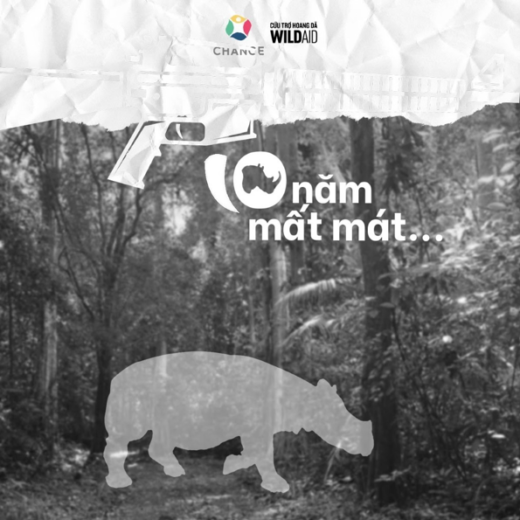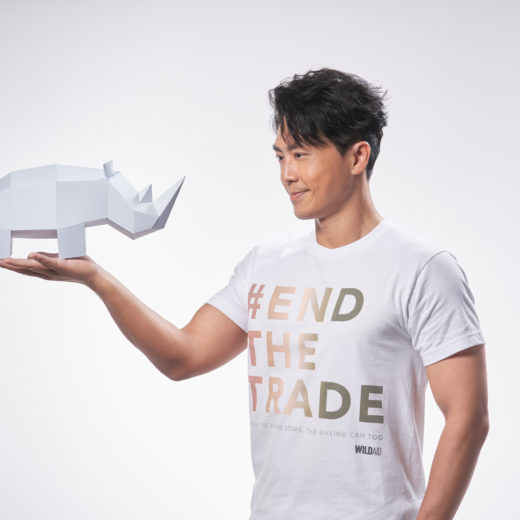
Just as the South African government reported fewer rhinos poached in 2018, Hong Kong SAR authorities yesterday announced a record-breaking seizure of rhino horn from two air passengers traveling from South Africa en route to Vietnam.
“While South Africa celebrates a decline in poaching, Hong Kong SAR makes another record seizure, showing the crisis goes on as rhino numbers continue to decline,” said CEO of WildAid Peter Knights.
On Wednesday, the South African Department of Environmental Affairs (DEA) reported that the number of rhinos poached in South Africa fell from 1,028 in 2017 to 769 in 2018 – a decrease of 259 or about 25%. However, in just a decade, more than 7,912 South African rhinos have been poached, according to government figures. With a total rhino population in South Africa of about 20,000, losing almost 8,000 to poaching over the past 10 years is clearly unsustainable.
“While fewer than last year, 769 poached rhinos is still way too many,” said Knights. “Although enforcement has improved in some areas and prices of rhino horn have fallen in Asia, the drop in poaching may be due, in part, to fewer rhinos and that it’s harder for poachers to find them.
“To stop organized crime we still need to prosecute the kingpins in South Africa and Mozambique as well as the buyers in China and Vietnam. Apprehending the foot soldiers and mules that have been caught to date is simply not enough.”


While fewer rhinos were poached in 2018, the number of incursions inside and adjacent to the Kruger National Park remained about the same at 2,620 while the number of rhinos poached there declined by 16% from 504 to 422.
Other areas with significant rhino populations had a higher decrease in poaching such as KwaZulu Natal (36%), North West (32%) and Limpopo (50%) among others, while Mpumalanga increased slightly from 49 to 51 rhinos poached and Eastern Cape increased 58% from 12 to 19.
Meanwhile in Hong Kong SAR Customs seized a record-breaking 40kg of rhino horns worth about US$1 million from two men arriving on a flight from Johannesburg. Officers found the rhino horns in two check-in carton boxes, as they were transiting to Ho Chi Minh City, Vietnam. In nearly all cases when seizures are made smugglers are caught but not their suppliers, bosses or those that buy the rhino horn.
The price of rhino horn has fallen from $65,000 per kilo to around $22,000 per kilo, rhino horn sales have been banned, and more people are aware of the false claims about rhino horn’s medical efficacy.
WildAid is working in Vietnam to raise awareness about the devastating impact of the wildlife trade and to encourage Vietnamese to stop buying wildlife products. In celebration of Lunar New Year, WildAid, the local NGO CHANGE, and prominent Buddhist leaders urged Vietnamese to start the new year by saying no to rhino horn, ivory, and pangolin scales. Lifelike statutes of the three species were placed before Buddha as if begging for protection from poachers.


Primarily composed of keratin, the same protein found in human hair and fingernails, rhino horn has no unique medicinal properties. A 2016 survey conducted by WildAid, African Wildlife Foundation and CHANGE in Vietnam showed that the number of respondents who believe rhino horn has medicinal effects declined by 67% in two years, down to just 23% from 69% in 2014. Those who believe rhino horn can cure cancer declined by 73%, down to 9.4% from 34.5% in 2014.
In South Africa, WildAid launched its “Poaching Steals from Us All” campaign in 2016 to build support for rhino conservation efforts and urge the government to solve the poaching crisis. Video ads and billboards feature well-known South African personalities such as DJ Fresh, Springbok rugby player Tendai “Beast” Mtawarira, comedian Marc Lottering, actress Masasa Mbangeni, DJ Poppy Ntshongwana, and Super Rugby players Scarra Ntubeni and Joe Pietersen. Leveraging pro bono media placement from global campaign partner JCDecaux, WildAid’s billboards were placed around South Africa’s main cities, airports, and shopping malls.
Last year, WildAid expanded its Poaching Steal From Us All campaign to Zimbabwe with Black Panther star Danai Gurira, in partnership with Zimbabwe Parks & Wildlife Management Authority and the Zambezi Society, to encourage support for anti-poaching efforts and visiting Zimbabwe’s national parks.
Stay in touch and get the latest WildAid updates.
SIGN UPAbout WildAid
WildAid is a non-profit organization with a mission to protect wildlife from illegal trade and other imminent threats. While most wildlife conservation groups focus on protecting animals from poaching, WildAid primarily works to reduce global consumption of wildlife products such as elephant ivory, rhino horn and shark fin soup. With an unrivaled portfolio of celebrity ambassadors and a global network of media partners, WildAid leverages more than $308 million in annual pro-bono media support with a simple message: When the Buying Stops, the Killing Can Too.
Journalists on deadline may email communications@wildaid.org


